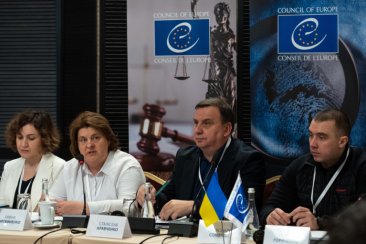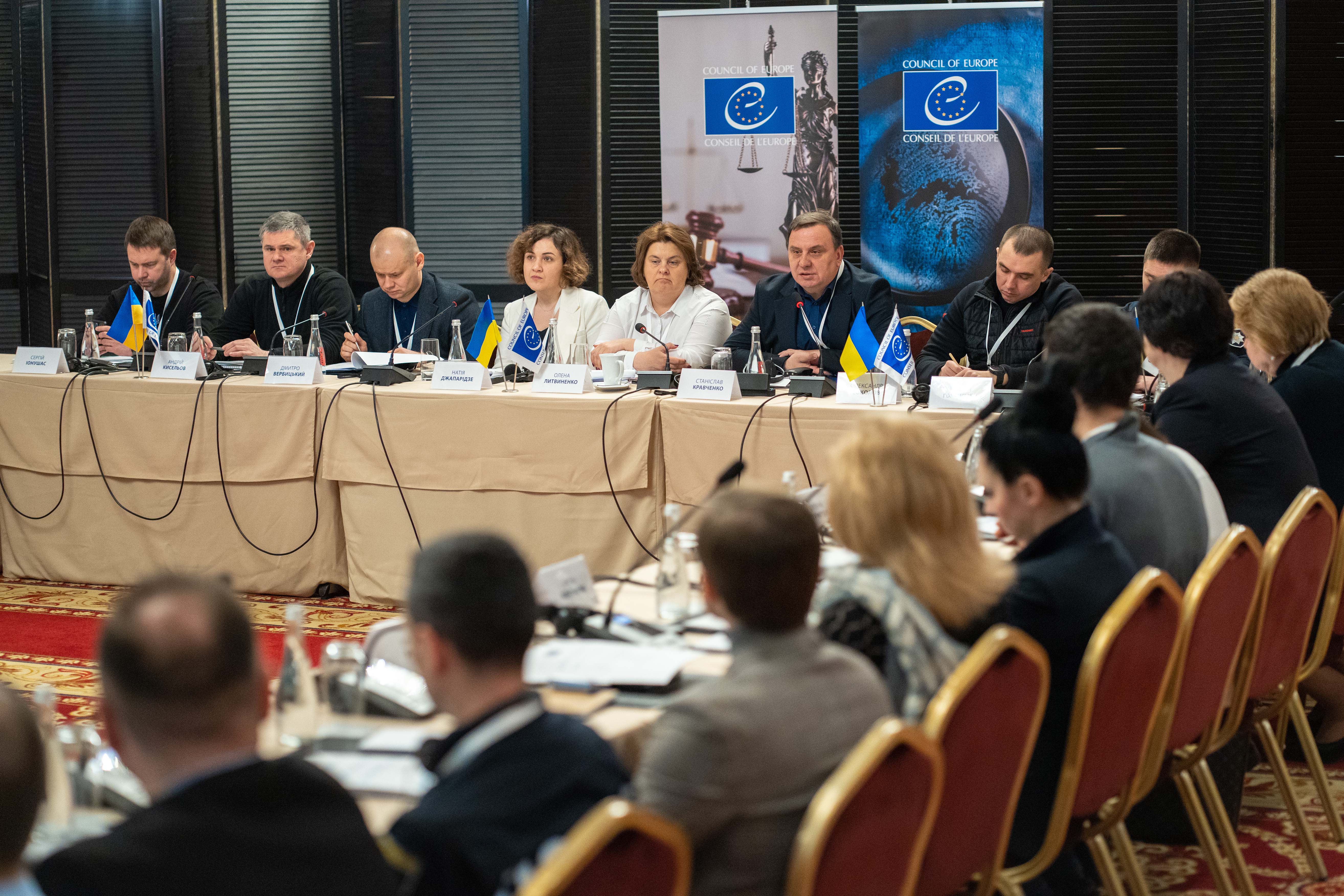Contact center of the Ukrainian Judiciary 044 207-35-46

In the first days of the full-scale invasion of Ukraine by the Russian aggressor, it became clear that if we acted only according to the old rules and regulations, we would not be able to meet the challenges of the judicial system in the realities of war. That's why the support and assistance of international partners, as well as the parliament's quick response to the difficult situation - prompt amendments to the legislation - were important at this time.
This was emphasized by Stanislav Kravchenko, President of the Criminal Cassation Court within the Supreme Court, during the session "Expanding Cooperation between the Council of Europe and Ukraine in the Field of Criminal Justice and Law Enforcement in the Context of War", which was held as part of the presentation of the Council of Europe projects "Fostering Human Rights in the Criminal Justice System in Ukraine" and "Strengthening Ukrainian Law Enforcement Agencies During War and Post-War Period".
Stanislav Kravchenko expressed his gratitude to the team of the Council of Europe Office in Ukraine, a long-standing and reliable partner of the Supreme Court, and noted that their support was of inestimable value to the entire judicial system, especially today, at a difficult time for the country.
The Head of the Criminal Cassation Court within the Supreme Court pointed out that in March 2022, the Parliament had adopted a number of legislative amendments that were essential for the organization of the courts and the administration of justice during the war. In addition, in July 2022, the Supreme Court, in cooperation with the Council of Europe Office in Ukraine, held an online conference on the specifics of criminal proceedings under martial law, with the participation of Jeremy McBride, an international expert from the Council of Europe.
Regarding further cooperation, Stanislav Kravchenko emphasized the importance of addressing urgent issues in the areas of strengthening human rights in the criminal justice system of Ukraine and enhancing the capabilities of Ukrainian law enforcement agencies during the war and in the post-war period.
According to him, one of the most important issues at present is to ensure the unity of case law on criminal proceedings related to war crimes at the national level, harmonizing it with international practice. Therefore, together, we must do everything to ensure that Ukrainian courts' decisions in war-related cases are perceived as fair worldwide. Because without a fair trial, there is no democratic state.
Speaking at the meeting of the Steering Committee of the Council of Europe project "Fostering Human Rights in the Criminal Justice System of Ukraine", the Head of the Criminal Cassation Court within the Supreme Court thanked the Supreme Court for becoming one of the main beneficiaries of the project.
Stanislav Kravchenko said that over the past year, the criminal justice system had clearly identified problems that need to be addressed.
In particular, it is necessary to ensure the development of consistent approaches to the pre-trial investigation and trial of war-related criminal proceedings. For that purpose, prosecutors, investigators and judges must be trained according to the same standards. At this stage, the cooperation between the National School of Judges of Ukraine and the Prosecutor's Training Center of Ukraine is important.
In fact, at the very beginning of the investigation, it is impossible to conduct it without the participation of investigating judges, who exercise judicial control over the observance of the rights, freedoms and interests of persons in criminal proceedings (this includes, in particular, the application of measures to secure the criminal proceedings, conducting covert investigative (detective) actions). In this connection, court decisions of investigating judges are important. Given the large number of cases in which investigating judges (not only from different courts, but also from the same court) issue contradictory decisions on a particular issue, it is necessary to ensure a mechanism for uniform judicial practice in those categories of cases that do not provide for a cassation appeal.

This issue is not regulated at the legislative level, so it is important to conduct joint training to develop unified positions of judges, investigators and prosecutors.
In addition, it will be extremely difficult to administer justice without greater emphasis on organizational measures to staff the courts. In the absence of the High Qualification Commission of Judges of Ukraine, the courts have not been staffed for a long time. At the same time, a large number of judges are in the process of resignation or dismissal for other subjective or objective reasons.
In addition, given that the courts are faced with considering a new category of cases due to the full-scale invasion, in particular war crimes, the Criminal Code of Ukraine should have clear provisions, and investigators, prosecutors and judges should interpret such terms as "waging aggressive war" and "violation of the laws and customs of war" in the same way (and this interpretation should be consistent with international law and the case law of the International Criminal Court).
Most criminal proceedings for crimes committed by the Russian occupiers are likely to be tried in absentia. In order for the Ukrainian and international community to recognize as fair court decisions made as a result of trials in the absence of the accused, there is a whole list of requirements that must be met. One of them is proper notification of the parties to the proceedings. The national legislation does not fully regulate this issue, so in this context, there is a need to improve the mechanism of notification of the parties to the proceedings. In fact, when considering criminal proceedings, there must be evidence of proper notice to the person accused of committing a crime, of such proceedings against him or her, and of the nature of the charges. If a notice to a person residing in the temporarily occupied territory or in another country is published on a Ukrainian website or in a Ukrainian newspaper, there is a high probability that the person will not be aware of the publication. In this case, it will be difficult to prove that he or she was properly informed of the proceedings against him or her. This may, for example, result in the reversal of a guilty verdict against him or her.
In addition, with regard to remote court proceedings, when a participant in criminal proceedings attends a court hearing outside the court, attention should be paid to compliance with the procedure for explaining rights, identification, etc., the violation of which may lead to negative consequences. In some cases, the remote work of judges, prosecutors, and defence attorneys in criminal proceedings can lead to the perception that a court decision is biased and unfair.
Summing up, the President of the SC Criminal Cassation Court noted that there were many issues in criminal justice that the CoE project could help address: in particular, general organisational support, assistance in studying legislation and implementing international standards, improving legislation, ensuring clear coordination and interaction between judges, investigators and prosecutors. In addition, the Supreme Court is ready to play the main organisational role in systematising all the problems that need to be urgently addressed.
For reference. The Council of Europe projects "Fostering Human Rights in the Criminal Justice System in Ukraine" and "Strengthening Ukrainian Law Enforcement Agencies During War and Post-War Period" are implemented within the framework of the Council of Europe Action Plan for Ukraine "Resilience. Recovery. Rebuilding" 2023-2026. The Action Plan is funded by Germany, the European Union, Sweden, Switzerland, the Human Rights Trust Fund, the United Kingdom, Poland, Luxembourg, Liechtenstein, Lithuania, and Portugal.
Photo courtesy of the Council of Europe Office in Ukraine.